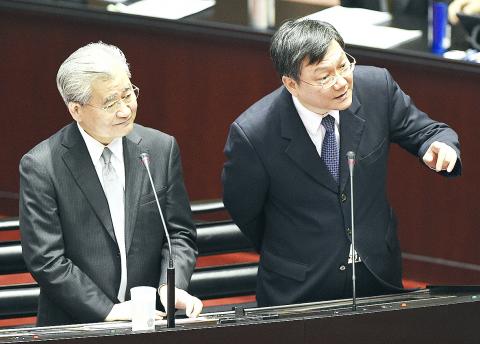Taiwan will start facilitating crowdfunding for entrepreneurs trying to start companies in the same way that Kickstarter helps product inventors, National Development Council (NDC) Minister Woody Duh (杜紫軍) said on Wednesday.
“Startups are the fruits of innovation,” Duh said in an interview in Taipei. “They benefit our economy and generate employment opportunities.”
The nation is seeking to attract innovative projects and people from around the world as part of an effort to revive industries, including textiles and technology, battered by lower-cost production in China.

Photo: Chen Chih-chu, Taipei Times
Taiwanese companies must innovate and invest in research and development to compete, said Duh, who was appointed in January.
The online platforms, designed to allow the public to buy stakes in small firms, are to be operated by local brokerages and regulated by the Financial Supervisory Commission.
The commission said in a Web cast late on Wednesday that only companies with NT$30 million (US$954,000) or less will be allowed to sign up.
The program is scheduled to start by May, Duh said.
Crowdfunding, which allows companies and people to raise money via online pitches, is a small, growing alternative to traditional finance.
Kickstarter is a New York-based Web site started in 2009 on which individuals can ask the public for funding for their creative projects. To date, US$1.6 billion has been pledged toward 79,000 projects, according to its Web site.
The government and venture capital funds plan to jointly raise more than NT$22.2 billion toward investing in Taiwan and Silicon Valley startups, according to a council statement this week.
These new companies can work with and help drive innovation in Taiwan’s existing industries, such as technology hardware, Duh said.
“We cannot compete with China on volume or mass production,” Duh said, adding that corporate profits should instead come from intangible resources such as research and development.
“We want to move the investment upstream,” he said.
Duh said that while China’s large market is attractive to entrepreneurs, he would not recommend it for young innovators.
“Startups are high risk in the beginning, and you are better off in a transparent environment,” Duh said. “A lot of things are not transparent in China, including their laws.”
Alibaba Group Holding Ltd (阿里巴巴) chairman Jack Ma (馬雲) announced this week a NT$10 billion fund to aid Taiwanese entrepreneurship, even after the company was asked sell or close its local operations by August for failing to apply for permission to set up in Taiwan as a Chinese company.
Ma said on Tuesday that his company complied with local regulations when it entered the nation.
“Any funding that complies with our rules is of course welcome here,” Duh said yesterday. “Taiwan also supports entrepreneurship.”

SEMICONDUCTORS: The German laser and plasma generator company will expand its local services as its specialized offerings support Taiwan’s semiconductor industries Trumpf SE + Co KG, a global leader in supplying laser technology and plasma generators used in chip production, is expanding its investments in Taiwan in an effort to deeply integrate into the global semiconductor supply chain in the pursuit of growth. The company, headquartered in Ditzingen, Germany, has invested significantly in a newly inaugurated regional technical center for plasma generators in Taoyuan, its latest expansion in Taiwan after being engaged in various industries for more than 25 years. The center, the first of its kind Trumpf built outside Germany, aims to serve customers from Taiwan, Japan, Southeast Asia and South Korea,

Nvidia Corp chief executive officer Jensen Huang (黃仁勳) on Monday introduced the company’s latest supercomputer platform, featuring six new chips made by Taiwan Semiconductor Manufacturing Co (TSMC, 台積電), saying that it is now “in full production.” “If Vera Rubin is going to be in time for this year, it must be in production by now, and so, today I can tell you that Vera Rubin is in full production,” Huang said during his keynote speech at CES in Las Vegas. The rollout of six concurrent chips for Vera Rubin — the company’s next-generation artificial intelligence (AI) computing platform — marks a strategic

Gasoline and diesel prices at domestic fuel stations are to fall NT$0.2 per liter this week, down for a second consecutive week, CPC Corp, Taiwan (台灣中油) and Formosa Petrochemical Corp (台塑石化) announced yesterday. Effective today, gasoline prices at CPC and Formosa stations are to drop to NT$26.4, NT$27.9 and NT$29.9 per liter for 92, 95 and 98-octane unleaded gasoline respectively, the companies said in separate statements. The price of premium diesel is to fall to NT$24.8 per liter at CPC stations and NT$24.6 at Formosa pumps, they said. The price adjustments came even as international crude oil prices rose last week, as traders

Taiwan Semiconductor Manufacturing Co (TSMC, 台積電), which supplies advanced chips to Nvidia Corp and Apple Inc, yesterday reported NT$1.046 trillion (US$33.1 billion) in revenue for last quarter, driven by constantly strong demand for artificial intelligence (AI) chips, falling in the upper end of its forecast. Based on TSMC’s financial guidance, revenue would expand about 22 percent sequentially to the range from US$32.2 billion to US$33.4 billion during the final quarter of 2024, it told investors in October last year. Last year in total, revenue jumped 31.61 percent to NT$3.81 trillion, compared with NT$2.89 trillion generated in the year before, according to